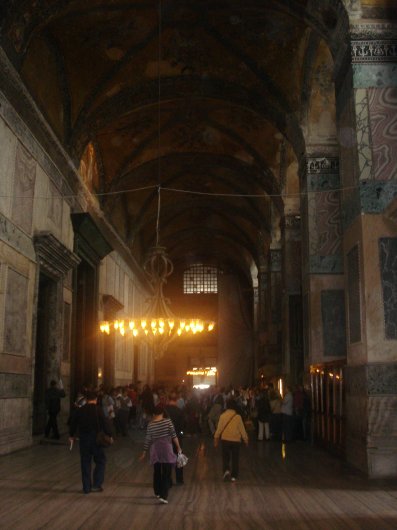 I have spent most of my younger Orthodox life being most concerned about offending God. Myself offending God. Others offending God. My people (us) offending God.
I have spent most of my younger Orthodox life being most concerned about offending God. Myself offending God. Others offending God. My people (us) offending God.
I’ve begun to think that God is most offended by how men act toward one another. Most offended by failure to love one another. By my failure. In other words, it is the offenses I commit against others that are the most grievous – not offenses against God per se. There’s no dichotomy, of course, for the one thing is the other. “Against Thee only have I sinned.” But it seems that failure to love one another is the worst sin.
I don’t mean philosophical or psychological love – how we think or feel about each other in theory or apart from action. It is so common to hold up philosophical “love” or mere warmth as superior to all, and claim that this is what Christ taught. Such an approach dismisses the fathers, who think quite differently. St. Photius, for example, said the highest form of love is to tell the truth. Something similar, I believe, was said by St. Maximus.
 So often, “love”, philosophical love, is held up in dichotomy with whatever the speaker doesn’t like. If you want to discuss getting rid of the pews and the organ, invariably someone will say “love is the most important thing.” If you want to talk of our obligations to fast and pray, you’ll hear “love is over all.” Usually, this is just a way of dismissing any unwanted or unliked discussion or suggestion, and represents an unanswerable superiority. It’s what logicians call a “thought terminating cliche” – a cliche that quells thought itself. In short, it’s talking of love without having love. It’s idle talk. Theory. The presumption is that this vision of love is something the speaker has, or knows of, and so is somehow elevated above the things that concern others, above the conversation.
So often, “love”, philosophical love, is held up in dichotomy with whatever the speaker doesn’t like. If you want to discuss getting rid of the pews and the organ, invariably someone will say “love is the most important thing.” If you want to talk of our obligations to fast and pray, you’ll hear “love is over all.” Usually, this is just a way of dismissing any unwanted or unliked discussion or suggestion, and represents an unanswerable superiority. It’s what logicians call a “thought terminating cliche” – a cliche that quells thought itself. In short, it’s talking of love without having love. It’s idle talk. Theory. The presumption is that this vision of love is something the speaker has, or knows of, and so is somehow elevated above the things that concern others, above the conversation.
But this is precisely not the kind of “love” or love-talk that I mean. I mean how one actually treats other people, including in those moments. Am I superior, or do I take the path of being inferior, as the Fathers teach? I am beginning to think that the biggest concern that God has expressed in the scriptures, in the liturgy, and in the consensus of our Fathers, is for how we treat one another – whether with kindness or mere civility, simple generosity or jealousy. He seems to forgive all manner of offenses against him, but stresses loving one another, and is much harder on those offenses.
I mean nothing especially profound, here. And I am still concerned about offenses against God. But I am beginning, I think, to shift, weighing things a little differently. It is much better that my brother offend God, than that I offend God even more by scorn in my heart for my brother.
 The liturgy says, “With fear of God, with faith and love draw near”. Some enterprising revisionists have expurgated the word ‘fear’, not understanding it, or sharing the Faith of our fathers who prayed this, and saved themselves, and then led us to the Faith. One writer has said, in true Orthodox fashion, that these correspond not only to the psychology of fear, faith, and love, but to the parts of the temple as well as to progress in Orthodoxy. Fear corresponds to the outer part of the temple, the narthex, and to the beginning of Christianity, by which we learn reverence, respect, awe, honor, the height of God and depth of our sin. And we never lose this, if we remain faithful. Faith represents the inner part of the temple, the nave, and standing with the faithful, confessing the true doctrines of the Church and singing true prayers. Love represents the chalice itself, the altar, and our approaching it, keeping in mind the prayers of access that we say (“that with boldness and without condemnation”), and the fullness of life in Christ and therefore life with each other – the peace with God that brings peace among all men.
The liturgy says, “With fear of God, with faith and love draw near”. Some enterprising revisionists have expurgated the word ‘fear’, not understanding it, or sharing the Faith of our fathers who prayed this, and saved themselves, and then led us to the Faith. One writer has said, in true Orthodox fashion, that these correspond not only to the psychology of fear, faith, and love, but to the parts of the temple as well as to progress in Orthodoxy. Fear corresponds to the outer part of the temple, the narthex, and to the beginning of Christianity, by which we learn reverence, respect, awe, honor, the height of God and depth of our sin. And we never lose this, if we remain faithful. Faith represents the inner part of the temple, the nave, and standing with the faithful, confessing the true doctrines of the Church and singing true prayers. Love represents the chalice itself, the altar, and our approaching it, keeping in mind the prayers of access that we say (“that with boldness and without condemnation”), and the fullness of life in Christ and therefore life with each other – the peace with God that brings peace among all men.
I seem to be making a little progress.
 St. Lawrence was summoned to the Emperor, who demanded he turn over to him the treasure of the Church. St. Lawrence ‘s response was to beg for time, which he received.
St. Lawrence was summoned to the Emperor, who demanded he turn over to him the treasure of the Church. St. Lawrence ‘s response was to beg for time, which he received.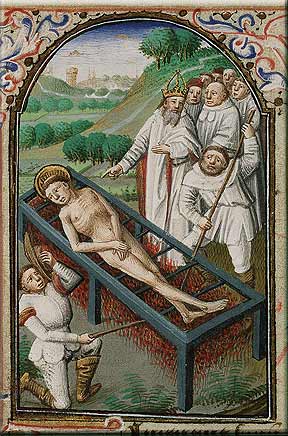 Angered at his audacity, the enraged prefect ordered that St. Lawrence be grilled alive on a gridiron. At one point during his torture, St. Lawrence joked with his executioners, “You may turn me over now, I’m done on this side.” And a little later, he added, “I believe I am quite done. You may now eat.” In Rome there is a shrine commemorating Lawrence that includes the gridiron used in his death. Perhaps in keeping with his humor, St. Lawrence is the patron of cooks.
Angered at his audacity, the enraged prefect ordered that St. Lawrence be grilled alive on a gridiron. At one point during his torture, St. Lawrence joked with his executioners, “You may turn me over now, I’m done on this side.” And a little later, he added, “I believe I am quite done. You may now eat.” In Rome there is a shrine commemorating Lawrence that includes the gridiron used in his death. Perhaps in keeping with his humor, St. Lawrence is the patron of cooks. I have spent most of my younger Orthodox life being most concerned about offending God. Myself offending God. Others offending God. My people (us) offending God.
I have spent most of my younger Orthodox life being most concerned about offending God. Myself offending God. Others offending God. My people (us) offending God. So often, “love”, philosophical love, is held up in dichotomy with whatever the speaker doesn’t like. If you want to discuss getting rid of the pews and the organ, invariably someone will say “love is the most important thing.” If you want to talk of our obligations to fast and pray, you’ll hear “love is over all.” Usually, this is just a way of dismissing any unwanted or unliked discussion or suggestion, and represents an unanswerable superiority. It’s what logicians call a “thought terminating cliche” – a cliche that quells thought itself. In short, it’s talking of love without having love. It’s idle talk. Theory. The presumption is that this vision of love is something the speaker has, or knows of, and so is somehow elevated above the things that concern others, above the conversation.
So often, “love”, philosophical love, is held up in dichotomy with whatever the speaker doesn’t like. If you want to discuss getting rid of the pews and the organ, invariably someone will say “love is the most important thing.” If you want to talk of our obligations to fast and pray, you’ll hear “love is over all.” Usually, this is just a way of dismissing any unwanted or unliked discussion or suggestion, and represents an unanswerable superiority. It’s what logicians call a “thought terminating cliche” – a cliche that quells thought itself. In short, it’s talking of love without having love. It’s idle talk. Theory. The presumption is that this vision of love is something the speaker has, or knows of, and so is somehow elevated above the things that concern others, above the conversation. The liturgy says, “With fear of God, with faith and love draw near”. Some enterprising revisionists have expurgated the word ‘fear’, not understanding it, or sharing the Faith of our fathers who prayed this, and saved themselves, and then led us to the Faith. One writer has said, in true Orthodox fashion, that these correspond not only to the psychology of fear, faith, and love, but to the parts of the temple as well as to progress in Orthodoxy. Fear corresponds to the outer part of the temple, the narthex, and to the beginning of Christianity, by which we learn reverence, respect, awe, honor, the height of God and depth of our sin. And we never lose this, if we remain faithful. Faith represents the inner part of the temple, the nave, and standing with the faithful, confessing the true doctrines of the Church and singing true prayers. Love represents the chalice itself, the altar, and our approaching it, keeping in mind the prayers of access that we say (“that with boldness and without condemnation”), and the fullness of life in Christ and therefore life with each other – the peace with God that brings peace among all men.
The liturgy says, “With fear of God, with faith and love draw near”. Some enterprising revisionists have expurgated the word ‘fear’, not understanding it, or sharing the Faith of our fathers who prayed this, and saved themselves, and then led us to the Faith. One writer has said, in true Orthodox fashion, that these correspond not only to the psychology of fear, faith, and love, but to the parts of the temple as well as to progress in Orthodoxy. Fear corresponds to the outer part of the temple, the narthex, and to the beginning of Christianity, by which we learn reverence, respect, awe, honor, the height of God and depth of our sin. And we never lose this, if we remain faithful. Faith represents the inner part of the temple, the nave, and standing with the faithful, confessing the true doctrines of the Church and singing true prayers. Love represents the chalice itself, the altar, and our approaching it, keeping in mind the prayers of access that we say (“that with boldness and without condemnation”), and the fullness of life in Christ and therefore life with each other – the peace with God that brings peace among all men.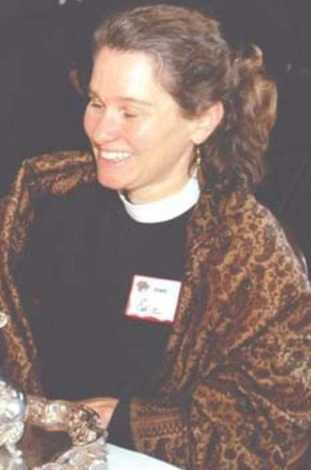 I once had a spiritual advisor, Edie, and among the things that she helped me with was this: I was starting to lose heart, because I was poor. The people around me had been saying that it’s a sign of God’s judgment on me, and that I should be ashamed because I couldn’t pay my bills, and was in debt, and had to pay late fees all the time. It’s so easy for the poor to become demoralized about being poor, but especially when the people of God are against you. But Edie gave the scriptures back to me. She read the Gospel to me and asked me, “Who are the poor?” Then she answered, “They are those who cannot pay their bills, who are in debt, and who have to pay interest and penalties all the time. It was this way even when Christ walked among the poor.” She added, “you cannot despise yourself for being poor, because then you would be despising the very thing that Christ does not despise. And as for judgment, it is those who despise the poor that Christ said he would judge. So love the poor, and be poor, and don’t despise anyone, and be saved.”
I once had a spiritual advisor, Edie, and among the things that she helped me with was this: I was starting to lose heart, because I was poor. The people around me had been saying that it’s a sign of God’s judgment on me, and that I should be ashamed because I couldn’t pay my bills, and was in debt, and had to pay late fees all the time. It’s so easy for the poor to become demoralized about being poor, but especially when the people of God are against you. But Edie gave the scriptures back to me. She read the Gospel to me and asked me, “Who are the poor?” Then she answered, “They are those who cannot pay their bills, who are in debt, and who have to pay interest and penalties all the time. It was this way even when Christ walked among the poor.” She added, “you cannot despise yourself for being poor, because then you would be despising the very thing that Christ does not despise. And as for judgment, it is those who despise the poor that Christ said he would judge. So love the poor, and be poor, and don’t despise anyone, and be saved.”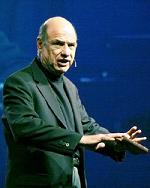 Over the years, I began to hear another luminary, Tony Campolo. He showed me how I live in the wealthiest nation in the world, or at least the most gluttonous, even if it is really on borrowed loot. “You know and I know that most of what we spend in any given year is spent on stuff that we don’t need.” Campolo showed me my poverty as riches compared to the truly poor of the world. I have always been able to eat, but there are mothers watching their children wither in their arms and their whole families die, because they cannot even find water. Here, it would be hard to find a poor dwelling without cable TV. Others in the world can’t even imagine owning something so valuable as a TV; an inexpensive one here would feed a family there for a year.
Over the years, I began to hear another luminary, Tony Campolo. He showed me how I live in the wealthiest nation in the world, or at least the most gluttonous, even if it is really on borrowed loot. “You know and I know that most of what we spend in any given year is spent on stuff that we don’t need.” Campolo showed me my poverty as riches compared to the truly poor of the world. I have always been able to eat, but there are mothers watching their children wither in their arms and their whole families die, because they cannot even find water. Here, it would be hard to find a poor dwelling without cable TV. Others in the world can’t even imagine owning something so valuable as a TV; an inexpensive one here would feed a family there for a year. Then eventually, I began again to listen to the Gospel itself, with ears unstuck, and I could hear Christ. I don’t mean any kind of ecstatic vision. I mean I could hear the simple words and see them in the present. And that’s when I realized that the poor are not only the hungry. They are those deprived of friendship or status (the stranger), of peace and comfort (the afflicted), of refuge (the naked and homeless). They are all those everywhere who want of grace, of the grace it has been given us to give them. The poor are covered with sores. They are the man of the tombs. They are the born blind and held in institutions. They are the abandoned spouse – the widow. The unwanted child – the orphan. The immigrant. They are those with a demon, the mentally ill, antisocial, illegal, hunted, turned against themselves and all men. And it is ever to the poor that Christ goes, ever with them that he concerns himself. I can hear Campolo say, “And you can’t be a Christian, unless you do likewise.” I can hear Edie say, “woe to those who despise the poor.” I can hear Christ, “inasmuch as ye have done it to the very least of all these – these my brethren…”
Then eventually, I began again to listen to the Gospel itself, with ears unstuck, and I could hear Christ. I don’t mean any kind of ecstatic vision. I mean I could hear the simple words and see them in the present. And that’s when I realized that the poor are not only the hungry. They are those deprived of friendship or status (the stranger), of peace and comfort (the afflicted), of refuge (the naked and homeless). They are all those everywhere who want of grace, of the grace it has been given us to give them. The poor are covered with sores. They are the man of the tombs. They are the born blind and held in institutions. They are the abandoned spouse – the widow. The unwanted child – the orphan. The immigrant. They are those with a demon, the mentally ill, antisocial, illegal, hunted, turned against themselves and all men. And it is ever to the poor that Christ goes, ever with them that he concerns himself. I can hear Campolo say, “And you can’t be a Christian, unless you do likewise.” I can hear Edie say, “woe to those who despise the poor.” I can hear Christ, “inasmuch as ye have done it to the very least of all these – these my brethren…”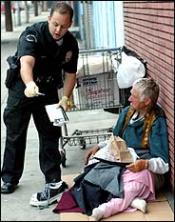

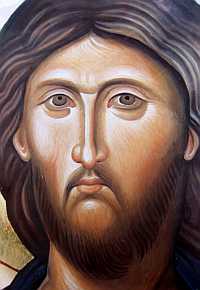 “Then shall he say also unto them on the left hand, Depart from me, ye cursed, into everlasting fire, prepared for the devil and his angels: For I was hungry, and ye gave me no meat: I was thirsty, and ye gave me no drink: I was a stranger, and ye took me not in: naked, and ye clothed me not: sick, and in prison, and ye visited me not.”
“Then shall he say also unto them on the left hand, Depart from me, ye cursed, into everlasting fire, prepared for the devil and his angels: For I was hungry, and ye gave me no meat: I was thirsty, and ye gave me no drink: I was a stranger, and ye took me not in: naked, and ye clothed me not: sick, and in prison, and ye visited me not.”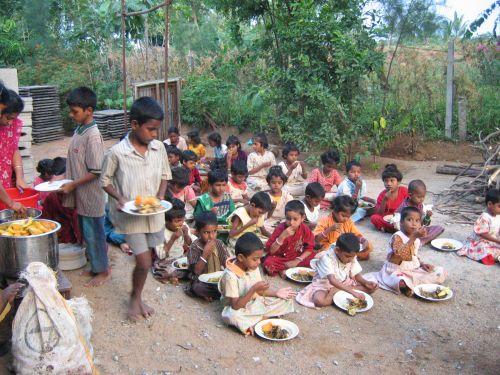
 I have found that it is possible for a person to be Orthodox, in the sense that they are baptized, chrismated, do penance, and receive communion, and yet not be Christian. Likewise, it seems possible for an organization to be an Orthodox Church, but not be a Christian community. This will seem controversial, but I think it’s so.
I have found that it is possible for a person to be Orthodox, in the sense that they are baptized, chrismated, do penance, and receive communion, and yet not be Christian. Likewise, it seems possible for an organization to be an Orthodox Church, but not be a Christian community. This will seem controversial, but I think it’s so.